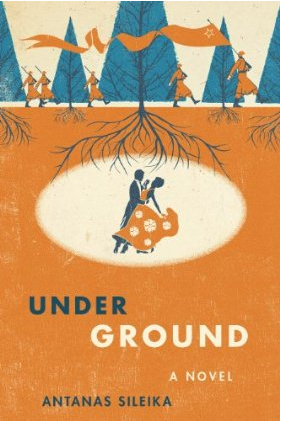Antanas Šileika’s Latest Novel
“How are we going to survive unless we turn our hearts to stone?” a comrade warns the hero of Antanas Sileika’s Underground. The question is an example of the elegant thinking that characterizes this rare and compelling chronicle…From its opening lines, the novel strikes a haunting note … This story picks up speed as it goes along, hurtling into the future and an unanticipated conclusion.
Toronto Globe and Mail
Sileika’s novel is a gripping tale, and the fate of Lukas – how long his luck runs – engages the reader to the last page.
National Post
Sileika writes with a spare style that suits the action sequences as well as the rare moments of tenderness or humour. Entertaining and sometimes shocking, the book describes a little-known period of European history that has been kept underground far too long.
Montreal Gazette
Sileika vividly brings this little-known (to us) and very sad chapter of European history alive…
Toronto Star
… the drama is exciting, haunting and instructional in turn. It opens with an explosive scene of startling violence, moves through episodes of mounting tension and dread, and concludes in a kind of lyricism.
Edmonton Journal

Antanas Sileika, a Canadian novelist and critic, a son of Lithuanian-born parents, is the author of two novels and one collection of linked short stories Buying on Time (nominated for both the City of Toronto Book Award and the Stephen Leacock Award for Humour). Underground, his newest novel, will be published in March of 2011 by Thomas Allen. In the words of its publisher Underground “explores the narrow range of options open to men and women in desperate situations, when history crashes into personal desires and private life.” For me Underground is also one of the still rare Canadian novels which delve into the stories from behind the former Iron Curtain, a tempting topic of conversation with its author.Posted on February 16, 2011 by Eva Stachniak
LCC Certificates were presented to following members
|
2009 m.
|
Teresė ir Pranas Pargauskai |
| 2008 m. | Lina Kuliavienė |
|
2007 m. |
Matas Stanevičius |
|
2006 m. |
Česlovas Senkevičius |
|
2005 m. |
Haris ir Gražina Lapai |
|
2004 m. |
prel. Edmundas Putrimas |
|
2003 m. |
Rūta Šiūlytė-Kličienė |
|
2002 m. |
Algirdas Vaičiūnas |
|
2001 m. |
Ramūnė Sakalaitė-Jonaitienė ir Vincas Piečaitis |
|
2000 m. |
Arūnas Staškevičius |
|
1999 m. |
Birutė Nagienė |
|
1998 m. |
Vytautas ir Sofija Balsevičiai |
|
1997 m. |
Vytautas Taseckas |
|
1996 m. |
Nekaltai Pradėtosios Mergelės Marijos Seselių Vienuolynas |
|
1995 m. |
Juozas Kralikauskas |
|
1994 m. |
Rita ir Juozas Karasiejai |
|
1993 m. |
Vytautas Bireta |
|
1992 m. |
Jonas Danys |
|
1991 m. |
“Volungės” choras |
|
1990 m. |
Petras Lukosevičius |
|
1989 m. |
Genovaitė Dumčiūtė-Breichmanienė ir Henrikas Nagys |
|
1988 m. |
Jaunimas badavęs 3 dienas prie USSR ambasados Otavoje: Marytė Balaišytė, Darius Čuplinskas, Indrė Čuplinskaitė, Linas Daukša, Dana Grajauskaitė, Viktoras Lukošius, Zita Prakapaitė, Marytė Rudytė ir |
|
1987 m. |
prel. Pranas Gaida |
|
1986 m. |
Algis Dūderavičius |
|
1985 m. |
Stasys Gailevičius |
|
1984 m. |
Vaclovas Verikaitis |
|
1983 m. |
Jonas R. Simanavičius |
|
1982 m. |
Antanas Rinkūnas |
|
1981 m. |
Elena Kudabienė |

